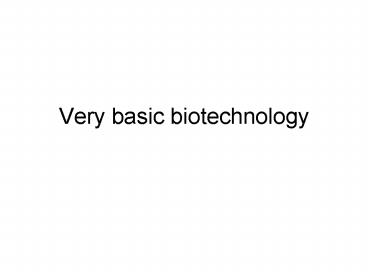Very basic biotechnology - PowerPoint PPT Presentation
1 / 25
Title:
Very basic biotechnology
Description:
Very basic biotechnology Some vocabulary Biotechnology Genetic engineering Recombinant DNA technology Restriction enzymes (endonucleases) Expression vectors What is ... – PowerPoint PPT presentation
Number of Views:115
Avg rating:3.0/5.0
Title: Very basic biotechnology
1
Very basic biotechnology
2
Some vocabulary
- Biotechnology
- Genetic engineering
- Recombinant DNA technology
- Restriction enzymes (endonucleases)
- Expression vectors
3
What is the relationship between science and
technology? (adapted from Kreuzer and Massey,
2005)
- Science
- Search for knowledge about ourselves and the
physical world - Process scientific method looking for patterns
in the physical world evaluated by how well
facts support conclusions limited by ability to
collect evidence - Discoveries give rise to technological advances
- Technology
- Practical application of knowledge adapting
ourselves to physical world - Process finding solutions to problems try to
control physical world evaluate by how well it
works limited by costs and available technology - Advances give rise to scientific discoveries
4
Advantages of working with microbes
- They grow fast (even single-celled eukaryotes
like yeast) - They dont take up much space
- They can be an economical source of
genetically-engineered material - They have the same DNA as all living organisms
5
Fundamental tools restriction enzymes
6
Thousands of restriction enzymes have been
isolated
- Can join DNA fragments from diverse species to
make recombinant molecules - Fragments can be cloned into expression
vectors to be inserted into microbes
7
Uses of genetically-engineered microbes (and
other living things)
- Protein production
- DNA production
- Gene regulation research
8
Genetic engineering
9
Techniques of DNA analysis
- DNA sequencing
- Human Genome Project, proteome, microbiome
- Polymerase chain reaction (PCR)
- Diagnostics, forensic analysis
- Probes
- Analysis of DNA within the cell (germline)
10
A single cycle of PCR
11
Amplification of DNA- without cloning!
12
A diagnostic application of PCR
13
Can you identify the sequence? Is is there? Can
you modify it?
14
Using probes the Southern blot
15
Discoveries about DNA led to new technologies
- People inherit regions of repeated DNA
- Not associated with disease or phenotype
- Minisatellites
- VNTRs
- STRs
- RFLPs
- Can be used to distinguish between people
16
Testing for inherited disease
17
(No Transcript)
18
Paternity testing blood types arent enough!
19
Forensic analysis
20
Applications of biotehcnology
- Biopharming
- Before extracts from animals
- Now recombinant molecules
- Grown in bioreactors
- Harvested from animals
- Transgenic plants and animals
21
Stem cell therapy
22
Why stem cells?
- Basic research
- Treat disease spinal cord injury, diabetes,
blindness, heart disease, leukemia - Adult vs embryonic stem cells?
23
GMOs (genetically modified organisms)
- GMO tutorial
- Arguments for
- weve always done it, this is just a new way to
do it - With pest-resistant plants, you need fewer
chemicals (safer, cheaper) - Might increase nutritional value (golden rice)
- Might help overcome dietary deficiencies
(vitamins, essential fatty acids) - Arguments against
- Are we making superbugs?
- Will these make us sick?
- Allergens
- Toxins
- Metabolic problems
- Will they disrupt the environment?
24
Transgenic animals
25
Summary
- Science drives technology, and technology drives
science. - Biotechnology has been around as long as humans
have practiced agriculture. - Biotechnology is used to conduct research,
develop new products, and improve processes. - DNA-based technologies have been developed in
microbes and other organisms. - As a society, we are responsible for using it
wisely.































